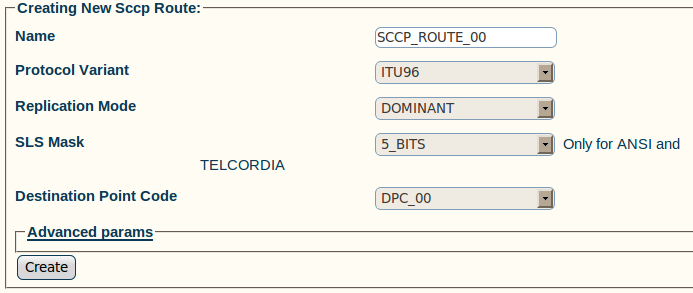Toolpack:Creating an SCCP Route A
From TBwiki
(Difference between revisions)
| Line 13: | Line 13: | ||
* Choose a [[Parameter: Name|Name]] for the new route | * Choose a [[Parameter: Name|Name]] for the new route | ||
* Select a [[Parameter: Protocol Type|Protocol Variant]] | * Select a [[Parameter: Protocol Type|Protocol Variant]] | ||
| − | * Select a [[Parameter: Replication Mode|Replication Mode]] | + | * Select a [[Parameter: Replication Mode|Replication Mode]] (ANSI96 and TELCORDIA variants) |
| − | * Select an [[Parameter: SLS Mask|SLS Mask]] ( | + | * Select an [[Parameter: SLS Mask|SLS Mask]] (ANSI and TELCORDIA protocol variants) |
* Select a [[Parameter: Destination Point Code|Destination Point Code]] (DPC) of the node where the route is terminating | * Select a [[Parameter: Destination Point Code|Destination Point Code]] (DPC) of the node where the route is terminating | ||
* Click '''Create''' | * Click '''Create''' | ||
Revision as of 09:00, 11 May 2012
Now that you have created an SCCP LSAP, you must create a new SCCP route for your system. This step in the Web Portal configuration exists to create a route to a specific destination point code (DPC).
To Create an SCCP Route:
1- Click Create new Sccp Route in the SCCP LSAP configuration window
2- Configure the new SCCP Route:
- Choose a Name for the new route
- Select a Protocol Variant
- Select a Replication Mode (ANSI96 and TELCORDIA variants)
- Select an SLS Mask (ANSI and TELCORDIA protocol variants)
- Select a Destination Point Code (DPC) of the node where the route is terminating
- Click Create
3- Verify that the "SccpRoute was successfully created" message appears
List of Parameters
- Name
- Protocol Variant
- Replication Mode
- SLS Mask (For ANSI and TELCORDIA variants only)
- Destination Point Code

